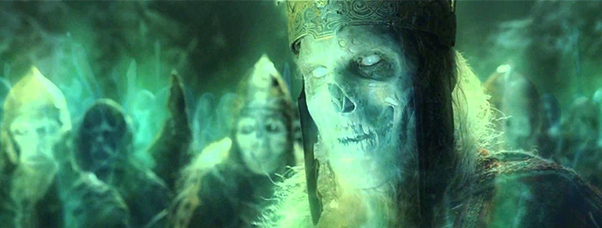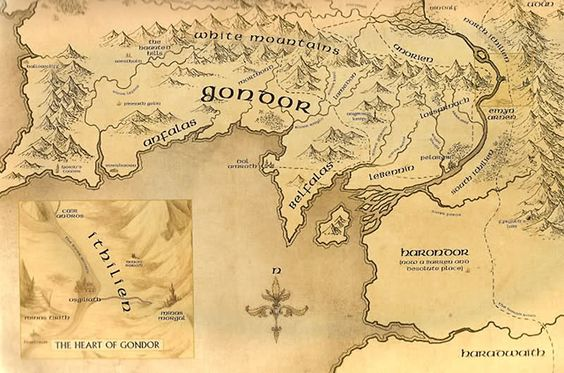Another quick #Tolkien thread.
Once again, we’re looking at a difference between the movies and the books, once again Aragorn’s a key part of it.
Who else is a key part? These guys:
#LOTR #Fantasy #TalkingTolkien
Once again, we’re looking at a difference between the movies and the books, once again Aragorn’s a key part of it.
Who else is a key part? These guys:
#LOTR #Fantasy #TalkingTolkien
As the story goes, the Army of the Dead are oathbreakers. They promised Isildur that they’d fight Sauron, but when the moment came scarpered off to the hills. Cursed for their betrayal, they lingered through the centuries, undead (and not loving it, presumably).
In book & film, Aragorn flexes his status as Isildur’s heir, offering to set the oathbreakers free if they fight Sauron . In the movies, they’re pivotal to the defence of Minas Tirith (a big CGI hand of god that tidies up the battle in short order, allowing the plot to continue).
(Again, I love these movies. Pelennor Fields is a rollercoaster of action and emotion, but the Army of the Dead rob a little of the awesome victory we were promised. However, that’s not why we’re here.)
In the movies, the Army of the Dead are the clinching argument that Aragorn is who he claims. He’s done something only Isildur’s Heir could do, so he must be the king, right?
Everyone accepts this, and Aragorn’s in charge from hereon out.
Everyone accepts this, and Aragorn’s in charge from hereon out.
But in the books, Aragorn’s kingship is proven by more than a glowy win-button in Minas Tirith’s time of need. The Army of the Dead are not the totality of his proof of rule, but the first step.
You see, in the books, Aragorn leads the Oathbreakers of Erech not to Minas Tirith, but against the corsairs ravaging Gondor’s fiefs. These raids are one of the reasons Minas Tirith is so poorly manned: Denethor’s oathlings are keeping back most of their forces.
Lamedon, Anfalas, Lossarnach, etc. don’t matter in the grand scheme. If Minas Tirith holds, Gondor holds. But they answer the beacons sparsely, or not at all.
It’s a subtle sign of Denethor’s failure. Unable or unwilling to protect the fiefs, he’s lost the moral authority that can compel them to come north.
(Denethor& #39;s a more tragic figure in the books. And he can& #39;t run as fast when on fire.)
(Denethor& #39;s a more tragic figure in the books. And he can& #39;t run as fast when on fire.)
And then Aragorn shows up with the Army of the Dead. He sweeps away the corsairs and claims their ships. This undoes the Oathbreakers’ curse, but it doesn’t matter: Aragorn now has an army of the southern fiefs at his back, and they reinforce Minas Tirith as all seems lost.
So both book and film show Aragorn as a man capable of leveraging his lineage. They show a war leader capable of strategy and cunning. But only the books show that he’s fit to be *king*.
Because when the beacons are lit, and Mordor empties against Minas Tirith, Aragorn’s first action isn’t simply to march to war – it’s to rebuild that which was sundered. He reunites the realm – something that generations of stewards have permitted to slip into ruin.
This ties back to one of #LOTR’s key messages: selfishness may give strength (Sauron) but so does selflessness. A tyrant is strong, but never as strong as when his victims stand shoulder to shoulder, with one purpose and one mind.
Gondor’s strength was never in its armies, but in its unity and purpose. Aragorn restores these.
Does this matter? Well, narratively it doesn’t. But in terms of character development & world building, the books offer a richer experience. It shows *why* Aragorn is deserving, but it also shows what a king (or any leader) should be. Not just a warrior, but a builder & a healer.
It’s a wonderful section of the books, and is possibly my favourite section in #TheReturnoftheKing. In a work sometimes attacked for celebrating feudalism, it shows *why* feudalism could work, if only monarchs matched the perfect ideal set by Aragorn, son of Arathorn.
(They can’t, of course, which is why feudalism is as disastrous as you might expect from a blend of oligarchy & gerontocracy. But it’s a fantasy world. If Isildur can curse the Oathbreakers of Erech to undeath just because he’s really angry, Aragorn can be the perfect king.)
It’s also one of those moments that gnaws away at another criticism I see levelled at Tolkien: that’s he’s all ‘tell’ and very little ‘show’. Aragorn puts Gondor back together and the narrator has nothing to say about it. He trusts you to spot it for yourself.
Could this have been shown in the films? Maybe. For all that it leaves on the cutting room floor, #ROTK has the most padding of the three movies, so there’s scope to play. But at the same time, #LOTR’s already swarming with names and characters. I can see why it was dropped.
On the other hand, were LOTR ever serialised for TV, this would be one of the first sections I’d restore. It goes a long way to making Gondor feel like more than Minas Tirith and Osgiliath, & highlights the stakes. It makes the world *bigger*, if only for a chapter or two.

 Read on Twitter
Read on Twitter




